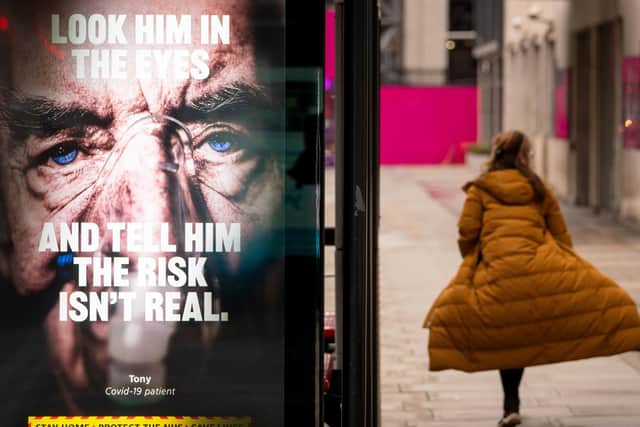Government's crass 'Stay at Home' message shows how the pandemic is disproportionately impacting women - Hannah Strawbridge
The advert depicted a man relaxing on the sofa, a woman home-schooling, looking after a baby and cleaning.
Embarrassing? Very. Surprising? Not really.
The Cabinet lacks diversity and in particular, adequate female representation. The effect of this is that decisions around the management of Covid do not adequately take into account how they impact on certain groups, and the long-term affects of this on individuals, society and the economy.


Advertisement
Hide AdAdvertisement
Hide AdCommentators continue to speak about the negative affect Covid has on women.
But we must question whether it is the fact of a pandemic and the consequential recession that causes this; or is it the way in which the pandemic is managed which causes this?
Saying that Covid denigrates women’s rights is dangerous as it leaves us all with a vague notion that there is nothing positive that can be done about it, we need to just ride it out and see what happens.
This isn’t good enough. It takes away responsibility from people to change things. It takes away responsibility from the people in charge to ensure that rights are protected.


Advertisement
Hide AdAdvertisement
Hide AdGiven that evidence shows that women are bearing the brunt of home-schooling, child-care and household duties as a result of the lockdowns, perhaps the Government’s advert is more accurate than any of us would really like to admit?
Women are more likely to lose their jobs, or quit them, as a result of the pandemic.
We don’t have data yet to explain why that is, which will be so important to consider when we do. But I know from many of my clients and friends that ultimately where the pressure to work and do everything else becomes too much to cope with, if they can reduce their hours, or quit their jobs, they will do.
What they won’t do is work to the detriment of their children.
Advertisement
Hide AdAdvertisement
Hide AdBusinesses can legally furlough staff for childcare reasons, but evidence shows not enough are doing this.
Again, why is this? Are the roles too important for the business to furlough? Are women fearful of asking as a result it might be looked down on later in their career?
More interestingly though, it feels like we all assume that women will be the ones to ask. What about men? Herein perhaps lies the issue.
There is also contradictory evidence to support schools closing, but I struggle to shake off for what me feels like the logical conclusion that if we are encouraged to work, whether that be at home or elsewhere, and the economy must remain open, then so should schools.
Advertisement
Hide AdAdvertisement
Hide AdThe impact of schools closing impacts on women and their place in the workplace, arguably more than men.
Therefore it will also impact on the numbers of female leaders in the future which will negatively impact society, business and the global economy.
This all seems to be of little importance though when we consider vulnerable women who are subject to domestic abuse and are forced to spend more time with their abusers in lockdown.
Have enough measures been put in place to help them specifically? Also, pregnant women who must shield.
Advertisement
Hide AdAdvertisement
Hide AdIf they are vulnerable at home, could this place them and their baby at greater risk than if they were in the workplace?
There isn’t an easy answer to any of this, and only the Government has the scientific evidence upon which they are basing decisions.
However, the longer the pandemic goes on for, the longer the lockdowns in place, the greater the impact on the rights and protection of certain groups, the greater the impact on mental health.